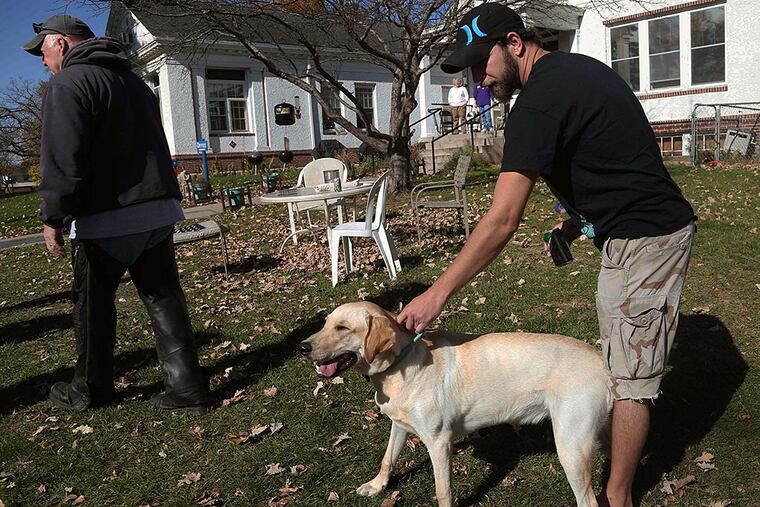After the war, a tough readjustment for some
I've become quite familiar with the routine of the twenty-something military veterans and reservists who enroll in my courses at the Northeast Pennsylvania community college where I teach history.

I've become quite familiar with the routine of the twenty-something military veterans and reservists who enroll in my courses at the Northeast Pennsylvania community college where I teach history.
Having returned from the war in Iraq or Afghanistan, they are hoping to better their lives by getting an education that will lead to a rewarding job. Most of the vets begin a new semester with great promise. They are bright and motivated, and they speak with conviction about life experiences that few of my younger students - or I - will ever know.
Then, suddenly, they miss a week or more of class. Some return with a letter from the local veterans' hospital explaining that they are suffering from post-traumatic stress disorder (PTSD). Others don't say why they've missed so much time, but I sometimes notice that the spark I'd seen before is gone, replaced by a blank stare, nervous energy, or a loss of interest in the material. Still others never return.
PTSD can be as debilitating as the physical wounds of war. In some cases, it never goes away completely, and it can significantly alter one's life. Yet for all the publicity about and sympathy for those with these wounds, few people understand the complexity of the disorder or that it also affects veterans of earlier wars.
The Department of Veterans Affairs' National Center for PTSD estimates that about a thousand veterans of the Iraq and Afghanistan wars are diagnosed each week with PTSD, and an additional 800 with depression. It is estimated that many more of the 2.5 million men and women who have been deployed in the war on terror suffer from these psychological conditions but remain undiagnosed.
PTSD can occur after someone experiences the trauma of combat. Among the basic symptoms are: "flashbacks" in which a vet constantly relives a traumatic event; avoidance of situations that may trigger memories; negative changes in feelings, especially fear, guilt, or shame; and "hyperarousal," or being constantly alert for danger. Symptoms must exist for at least a month to be diagnosed as "acute stress disorder."
War veterans are not the only ones affected by PTSD. The disorder can develop in any victim of a traumatic event, including terrorism, childhood sexual or physical abuse, sexual or physical assault, severe injury, and natural disasters. Most people who experience such trauma show symptoms at the outset, but only some will develop PTSD over time.
Combat soldiers are especially vulnerable to the disorder because of their constant exposure to highly traumatic situations. Often these soldiers have trouble reintegrating into society. The difficulty is due in part to the trauma itself, but also the intensity of daily life in a battle zone. Upon returning home, they may feel alienated from those who used to be close to them or struggle with feelings of remorse, self-hatred, or the "survivor's guilt" that can result from the violent death of a comrade in arms.
The term "post-traumatic stress disorder" didn't become widely used until the 1980s, but thousands of veterans of Vietnam and previous wars suffered from it. In some of those wars, soldiers who experienced what was referred to as "battle fatigue" or "shell shock" were considered "cowards" and offered little help or sympathy.
After World War II, Korea, and Vietnam, growing numbers of veterans were reporting the same symptoms, including anxiety, nightmares, depression, and problems with relationships. Too often, they were left to fight their own private battles against PTSD, while what was then the Veterans Administration and the federal government alternated among denial, acknowledgment, and support.
Making PTSD an entry in the Diagnostic and Statistical Manual of Mental Disorders gave credibility to combat soldiers' experiences, with the hope of reducing the stigma attached to seeking help.
If someone you know is struggling, here are some things you can do to help, according to the National Center for PTSD:
Learn about readjustment to civilian life.
Offer to listen without forcing the issue.
Realize that the stigma of PTSD can be a barrier to seeking treatment.
Encourage the veteran to seek help through a mental-health professional or a local Veterans Affairs facility.
The war in Afghanistan may be winding down, but, for thousands of young men and women who served our country, the struggle to regain a happy and productive life is just beginning.